| Reviews & Columns |
|
Reviews DVD TV on DVD Blu-ray 4K UHD International DVDs In Theaters Reviews by Studio Video Games Features Collector Series DVDs Easter Egg Database Interviews DVD Talk Radio Feature Articles Columns Anime Talk DVD Savant Horror DVDs The M.O.D. Squad Art House HD Talk Silent DVD
|
DVD Talk Forum |
|
|
| Resources |
|
DVD Price Search Customer Service #'s RCE Info Links |
|
Columns
|
|
|
10 Years of Rialto Pictures (10-Disc Box Set)
THE MOVIES:
Reader's Note: Some of these reviews are shorter versions of longer pieces I have written either here at DVD Talk or at my own Criterion-centric blog, Criterion Confessions. Though a portion of the write-ups may be recycled, I did actually watch all the discs in the set in order to confirm quality and content.

In Portland, we have a great movie theatre called Cinema 21, named for its location on 21st Avenue. I've seen many an art-house and revival film there, and over the last decade, quite a few of those had a Rialto Pictures logo at the start of the movie. In fact, I started to expect to see it, especially when catching a screening of a foreign noir picture or the latest Godard reissue. Not only could I trust the taste of the folks at Rialto enough to know I was in for a treat, but if I liked it enough to want to own the flick on DVD, then I could expect a Criterion Collection release a few months down the line.
I would have thought that the company was much older than only ten years given the age of most of their material, but then it also makes sense that, having lived in Portland for fourteen years, my time spent sitting in the seats at Cinema 21 would be so tangled up in Rialto's history. Quite a few of the films contained in their celebratory boxed set, 10 Years of Rialto Pictures, were ones I saw at Cinema 21 for the first time, like Melville's Army of Shadows, Becker's Touchez pas au grisbi, Dassin's Rififi, and Godard's Band of Outsiders. Carol Reed's The Third Man was a movie I had seen on cable and video, but the Rialto restoration was the first time I had seen it on film, projected on a theatre screen.
All ten films here, with the exception of Murderous Maids, have been released as Criterion DVDs, and this boxed set is put together in conjunction with the Criterion collection, as well. (Murderous Maids was released in 2003 by Criterion's former parent company, Home Vision Entertainment.) The set's intention is to hip film fans to Rialto's back catalogue, providing a quick introduction to classic and foreign films that have marked their history, and so they are offered as streamlined discs, not as the tricked-out Criterion editions--though, from what I can tell, they are all the same transfers. Below, I will go through the films as they are listed on the box: in alphabetical order. Each disc is packaged in an individual slim plastic case with a cover using the reissue poster created by Rialto for their revivals. Inside each case is a folded one-sheet featuring credits, chapter listings, and short liner notes on each movie. The discs have no extras themselves outside of a handful of theatrical trailers.
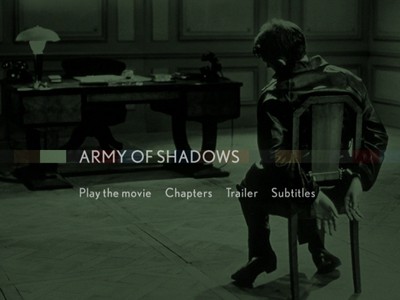
* Army of Shadows (1969): At a crucial point in Jean-Pierre Melville's 1969 ode to the French Resistance, Army of Shadows (L'armée des Ombres), his hero, Gerbier (played with a sober, contemplative gait by Lino Ventura), has been captured by the Nazis and is marked for execution. In a twist of cruelty, the Germans line up their prisoners and tell them to run. If they can reach the far wall of the rather large room they are in, they will live to be shot a different day. If they are gunned down before they get to the other side, well, c'est la vie.
When the head Nazi starts the race, Gerbier is convinced he will not run, but once the bullets begin to fly, his legs start pumping and he's beating feet just like the rest of them. He's not happy with himself for doing so, but it's not out of any self-loathing or recriminations for being a coward. What bothers him is that everyone thought he would run, and they turned out to be right. How did they know?
There is not a lot of self-reflection in Army of Shadows. Melville, who also adapted the screenplay from a novel by Joseph Kessel, doesn't spend much time building up his heroes or explaining the mechanics of the resistance movement. By the time he plops us down into the middle of the campaign to liberate France from the Nazi invaders, the action is already underway. So, this scene comes off less as an object lesson in German cruelty and more as an existential parable. Why indeed would they think Gerbier would run from their gunfire? It's a stand-in for the bigger question: why did they think the French would lay down and die? Gerbier's run for self-preservation is a sprint for his country.
As portraits of patriotism go, Army of Shadows is a strange, wonderful beast. There are no rah-rah moments where defiant Frenchmen stand and wave the French flag and sing "La Marseillaise." To speak is a sin. You can be locked up just for publicly referring to a Nazi official as a "jackass." Instead, the men and women who work with Gerbier operate as a silent pocket universe, separate from the rest of France, and even separate from the rest of the Resistance movement. It is implied that there is a more extensive network of freedom fighters--and indeed, they even have a great leader who unites them all (Paul Meurisse)--but any contact we see between this group and their comrades is rare. They exist out of time, out of space.
It's rare to see a celebration of stoicism that remains stoic right to the end, but Melville is praising the sacrifice of people who did what they did with no expectation of praise. The full price of that sacrifice is apparent in the carefully chosen moments when they have to accept actions they would have never undertaken were circumstances different, such as Gerbier having to conduct his first murder of a traitor (and how much more easy it is later), or the excellent Simone Signoret, playing the formidable Mathilde, seeing her resolution coming and knowing that this time it's better if she doesn't run. The conclusion of Army of Shadows is fatalistic and almost melancholy, and yet Melville and his characters clench their jaws for it, never crumbling. Anything less, though, and we wouldn't understand the full consequence. In these moments, in the crisis of conscious Gerbier experiences after the Nazi death game, everyone must ask how far they would go, and if sometimes going too far means coming full circle and betraying your own ideals. Only then, when you keep pushing despite the doubts, is true heroism achieved, be it heroic or not. It's the director's final tribute, staying true to the strength that kept his countrymen going.

* Au hasard Balthazar (1966): Throughout his many films, French writer/director Robert Bresson struggled to realize his unique, almost dogmatic ideas about how to achieve truth and meaning through motion pictures. His many theories were detailed in the collection of his writings, Notes on the Cinematographer, and through almost koan-like snippets of thought, he tries to break down his aesthetic concepts. In particular, he writes about how a director should push his actors--or as Bresson called them, models--to get past stylized behavior, forcing them into a kind of blank-slate state where their actions are automatic and convey whatever the script demands through a practical lack of conveyance. Through nothingness, they could achieve everything.
Knowing this, then we can assume that Bresson found his ideal model in the form of the donkey, Balthazar, who is the central figure in the filmmaker's 1966 allegory Au hasard Balthazar. The animal's patience, his deep stares, his lack of language--all of these things contributed to the creature being the ultimate mirror for Bresson to hold up to humanity and reflect its most selfish and dark impulses.
On a provincial farm in rural France, Balthazar is adopted by the children of the landowner. For a summer, he is the companion of the boy Jacques, his sisters, and Marie, the daughter of the local schoolteacher. The kids baptize him in a mock ceremony and name him for one of the three wise men who traveled to witness Christ's birth. So, too, does this Balthazar become a witness, first to the young love between Jacques and Marie, and then to the death of Jacques' youngest sister. It's the animal's first life lesson, that happiness and misery often come hand in hand, and it's the beginning of the erosion of innocence that Balthazar will resiliently stand against.
Amazingly, through all that Balthazar must suffer, Bresson never makes the animal pitiable. He is Christ-like in this way, ready to accept the indignity and punishment of the mortal world in order to inspire greatness in others. In the final scenes, the local thug loads the donkey down with treasures, prodding him on a journey through the night toward the promise of greater reward--a twisted version of the Biblical Balthazar's journey to Bethlehem. This little smuggling operation runs afoul of the law, though, and Balthazar is abandoned. Left alone and on his last legs, wounded in the side the way the crucified Christ was stabbed by Roman soldiers, Balthazar is transformed into a saintly figure, a martyr. He wanders into a field and joins a flock of sheep, and they gather around him, the multitude welcoming him home. It is at once sublime and sad.
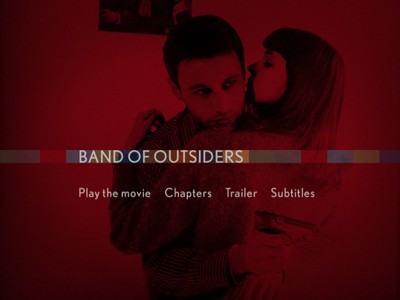
* Band of Outsiders (1964): Jean-Luc Godard's Band a part has been gaining in reputation over the years as one of his most playful self-reflexive genre benders, a riff on a Fritz Lang film noir that manages to confine the director's impulses in its old Hollywood structure and also give him as much freedom to goof around as he was ever likely to find. Even more so than his musical comedy A Woman is a Woman, this meta heist picture brims with the joyous belief that anything is possible. As long as there is film in the camera to capture it, nothing is too silly. Perhaps it was the fact that a Technicolor musical was already expected to be fun that makes A Woman is a Woman slightly less so than Band of Outsiders, as if fun is its own restriction whereas the daring of the unexpected is far more liberating.
As with most of Godard's genre deconstructions, Band of Outsiders has a plot of sorts. Two thugs--the physical Arthur (Claude Brasseur) and the more sensitive Franz (Sami Frey)--vie for the affection of Odile (Anna Karina), both because she is cute as can be and because her miserly uncle keeps a fortune hidden in his big house on the outskirts of town. Odile is cold yet interested, not necessarily committal but not entirely aloof. As with anything, the guy who pushes the issue has the most success, and so Arthur has the edge on Franz. One can bully in romance just as one can be a bully in anything else. It's also Arthur who pushes hardest for the crime, and Odile and Franz must just go along, even as it is clear that they are heading for disaster.
Like any heist film, more time is spent on the planning than the robbery itself. In the case of Band of Outsiders, though, the gang doesn't sit and pour over plans as much as they sit and pour over each other. The preamble to the act involves a lot of sitting around and waiting, of biding their time as if they are at a job and waiting for the boss to leave for the day. Here is where Godard gets most of his kicks. It's in these moments of boredom where inspiration can blossom. Thus, we get the trio dancing "the Madison" in a cafe, framed like a pause in the film, a momentary aside (and later to inspire Quentin Tarantino, whose production company's name is a play on the movie's French title). We also get the famous scene where they see how fast they can race from one end of the Louvre to another.
In the end, the outcome Godard provides for his characters is like an affirmation of their choices. Franz and Odile are more adaptable, subject to change, more in tune with the demands of the heart, whereas Arthur must plow forward like a bull intent on the single target, even as it becomes more evident that doom lurks in the background. Though Arthur's fate is just as much a staple of gangster movies as Odile and Franz's fate, it is also the more real, fulfilling its own promise. As for the others, Godard tells us they will have a happy ending that is generally only found at the end of a Hollywood production, and they will have an ever after seen in a sequel that there was likely never any serious intention to make. It's as if riding off into the sunset is more final than the alternative, or perhaps just unreachable. Only in Hollywood, not anywhere else, and not amongst the self-invented wannabes of a B-movie love story from France.
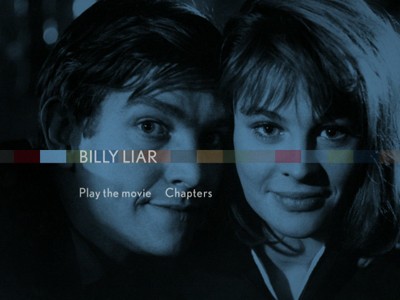
* Billy Liar (1963): Billy Liar was Julie Christie's third film, but the first role to really get her noticed by the public. It's a supporting part, barely more than a cameo, but director John Schlesinger clearly saw the star cresting over the horizon, as he gave her the final spot in the opening credits. "And JULIE CHRISTIE," it proclaims, as is normally done for a big name that doesn't get a place above the title but deserves to be singled out. Though the actress is really only in four scenes of the movie, not counting her background role in Billy's fantasies, she ends up being the thing you remember most about it. Our first introduction to her ends up completely separating us from Billy for the only time in the entire movie, following Liz around town, watching her turn heads wherever she goes--often quite real reactions, as this sequence was shot on the street, verite style. That final shot of her looking out the train window, her expression a mixture of pity, regret, and true caring, is the sort of thing that probably haunts many a man's dreams as the years grow long. In that moment, Julie Christie represents the opportunity missed, the moment we let pass that we should have grabbed.
Not that I should let Liz completely overshadow poor Billy (played by the marvelous Tom Courtenay), but she does end up being the central point in the screenplay where the character has the chance to finally stop talking and actually do something. His nickname of Liar is well earned. He tells stories about sisters that don't exist, injuries his father never sustained, has two fiancées at the same time, and a host of other mistruths large and small. He's an interesting character, because though he fits in with so many other creative dreamers that we've seen in other movies, he's not always redeemable in his actions. Unlike, say, Max Fischer in Rushmore, who also dreams big and tells plenty of fibs, Billy has never stopped to think about the feelings of others. Where Max's tall tales eventually get him in over his head and he becomes careless, he's never really malicious. Selfish, sure, but not callus.
The key to our having sympathy for Billy is in Tom Courtenay's performance. Though the small-minded and obnoxious people around him--his boorish father (Wilfred Pickles), his self-important boss at the funeral home (Leonard Rossiter) with his models of plastic coffins (talk about a metaphor for a foreboding future!), the shrill Rita (Gwendolyn Watts) and the prudish Barbara (Helen Fraser)--are enough to make us understand why maybe Billy would need to retreat into his imagination, it doesn't really excuse his lack of moral consequence. He shouldn't be sympathetic, yet Courtenay manages to make the boy extremely vulnerable, always spreading a thin layer of anxiety under the braggadocio. Billy fears his own lies will collapse on top of him, and he'll be stuck going nowhere forever.
So, why then, can he not go through with leaving when Liz suggests they flee together? Liz knows it probably even before he does, hence how his suitcase appears on the station platform before he can conveniently miss getting back on the train, having jumped off to buy milk, that most wholesome of drinks. I thought at the outset that it was cowardice, that Billy didn't have the guts when it counted, but as I wrote this all out, my thoughts became more clear. It's that bit about not having any sense of moral consequence. To run to London, Billy would leave behind troubles at home and the mess he's created for himself at work, as well as the broken hearts of Rita and Barbara, without actually dealing with them. It would be a true escape, a cut and run.
To stay means to accept the responsibility of what he has done, to face it and be a man. This makes way for the final fantasy, of Billy marshaling his troops and marching back to the house he grew up in, prepared for the war of his life. With this decision, Billy Liar may have let Julie Christie go, but he finally embraced himself and what it means to be a man.
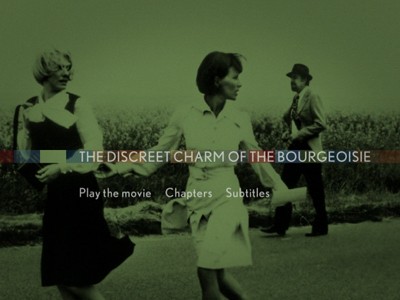
* The Discreet Charm of the Bourgeoisie (1972): The Discreet Charm of the Bourgeoisie is an episodic savaging of the well-to-do French middle-class. An old surrealist, Bunuel builds a puzzle box of a movie, full of stories within stories, dreams within dreams. At several points, we cut to one of his dyspeptic gentlemen waking from sleep, horrified by what he--and by extension, we--just saw. Amusingly, the dreams often go several scenes back, including another guy waking up in bed, so that the second dreamer was actually imagining the first dreamer and his disturbing vision. Not unlike watching a film where the characters might suddenly become aware they are being watched. Or if the viewer could turn around and discover that he or she is being filmed.
The vignettes all revolve around meals that six friends try to partake of together. Luncheons and dinners are how these people congregate, the way they gather to share their banal views on politics and the world around them. They are demanding of the service class and blind to their problems. On their first outing, where the would-be diners are required to a go to a restaurant due to a mix-up with dates, they discover that the owner of the inn has died and is in the next room waiting to be taken to the funeral parlor. The employees he left behind plan to go on with their duty and still serve customers, but the friends all leave rather than have their meal. Not because they feel bad, but because they find it inconvenient. They can't even see the necessity of work, that these others must carry on in order to survive.
All of the meals this group tries to sit down to are interrupted in similar ways, and in each, something is revealed about the humanity the bourgeois are so desperate to bury beneath their tailored manners and carefully chosen banter. One lunch is postponed due to the host and hostess, Alice and Henri Senechal (Stephane Audran and Jean-Pierre Cassel), having sex outside in the bushes rather than be heard doing it in the house. Not that it wouldn't be easier to control their urges, but suppressing them would be admitting they have them. One dream of a failed dinner party sees the group on stage, mocked by an audience, Henri unable to remember his lines. In a dream immediately after, Rafael (Fernando Rey), the South American ambassador of the fictional country Miranda, shoots the host, an army colonel (Claude Pieplu), for insulting his country; again, not because it's untrue, but because you don't say such things out loud. This is the same group, after all, where the men smuggle cocaine into the country but will sit around sipping martinis and denouncing drug addicts as disgusting.
Bunuel clearly finds the social mechanisms of the bourgeoisie to be hilarious, and the discreet charm he is looking for encompasses the hypocrisies and the foibles that they try to pretend don't exist. Greed, hunger, lust, these are all things they assume of the common man, but never of themselves. The director's scenarios are like little pranks he plays on his subjects, provoking them to react. Yet, in the end, the fate that Bunuel's dinner party suffers is that of their own making. Each interruption carries with it the fear of punishment, that sins will be exposed. It's ironic, then, that when the punishment does come, there are no charges leveled against them, and of course they admit to nothing. Yet, when Rafael destroys his own escape by exposing himself in order to get another bite of lamb, the implication is obvious: they do it to themselves. Of course, it also makes sense that we are now in Rafael's dream, and upon waking, having learned nothing, he runs to the fridge to devour some leftovers like a wild dog tearing into roadkill.
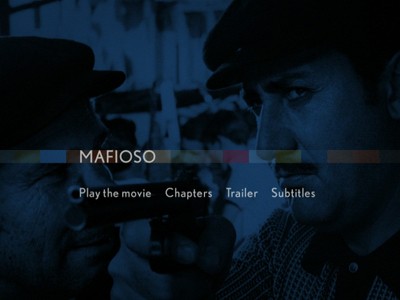
* Mafioso (1962): Alberto Lattuada's 1962 film Mafioso is one of the more delightful surprises of the last couple of years. This dark Italian comedy is the granddaddy of modern crime films like the Ben Kingsley vehicle You Kill Me or the Robert De Niro/Bill Murray picture Mad Dog & Glory--violent, wicked gems that make light of heavy subjects without denying the bile that lends the laughs their tragic bitterness.
In Mafioso, Fellini-regular Alberto Sordi plays Nino, a middle-aged Sicilian who has made a career for himself as a factory supervisor in Milan. His job is to make sure that the men on the assembly lines run their machines with absolute precision. In the very first scene, he chastises one of his underlings for going too fast, for not pausing properly so that the holes he drills in a little metal plate are perfectly exact. Such details are important to Nino.
It has been quite a long time since Nino has visited his hometown. So long, in fact, that his family has never met his wife, Marta (Norma Bengeli), and their two daughters. Part of this is that Nino has been so devoted to his duty at the plant, he has not taken a vacation; another part of it is that he left Sicily under circumstances that are unclear, maybe even a bit shady. The first hint that something is amiss is when his boss, an émigré from New Jersey, asks Nino to deliver a special package to Don Vincenzo (Ugo Attansio), whose very name brings a hush whenever spoken. Indeed, Nino's birthplace in Sicily is like a whole other world in comparison to mainland Italy. The difference between his curvy blonde wife and his moustachioed sister (Gabriella Conti) is immediately obvious, and then, of course, there is the vociferous welcome Nino receives, not just from his family but from seemingly everyone he's known since elementary school. Compared to the ordered, mechanical existence Nino lives in Milan, his Sicilian life is chaotic and pumped full of blood. There are also telltale signs of violence everywhere.
All of this seems completely counter to the gregarious persona Sordi portrays as Nino. He is boisterous, always positive, eager to see peace between his wife and his clan. Thus much of the comedy comes between the collision of happy, smiling Nino and the darker memory folks apparently have of him. On one side, they see him as successful and happy, his blonde wife being a curvy emblem of the good fortune he has had off of the island. They build sand castle women to look like her, never imagining they will meet a lady with such little body hair. On the other side, though, there is Don Vincenzo and his chilled-out emissary, Don Liborio (Carmelo Oliviero). Taking a trip down memory lane, Liborio buys Nino a hat like his cohorts wear and takes him to a boardwalk shooting game--where Nino manages to hit every target.
The serious precision with which Nino aims his gun hearkens back to his description of proper working methods back at the factory, and it also begins to show us what Nino, the happy husband and father, may have lurking in him. The idea that this man is a mafia killer is not just opposed to our first impressions of Nino, but it also plays against type for Sordi, who is usually the life of the party. Here he smiles big and talks with a booming voice, but there is nothing threatening about him. Yet, the switch between citizen and gangster is somehow natural, neither jarring nor harsh. It's like the old adage, "business never personal." Director Alberto Lattuada and his legion of scriptwriters make the switch in the story with just as much ease. There is a third act shift where Vincenzo and Liborio's interest in Nino is explained, and Mafioso takes a flight into all new territory that is tense and exciting. We end up seeing it long before Nino, and perhaps that's why we are less surprised, though I'd defy anyone to guess exactly what is going to go down.
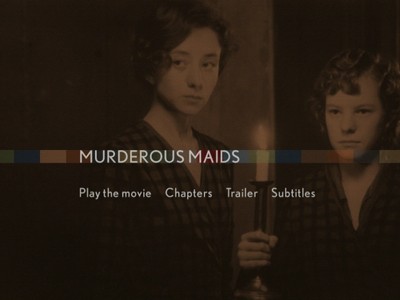
* Murderous Maids (2000): Not nearly as exploitative as the title makes it sound (and likely, the title was ripped from the untranslated headline we see late in the picture), Murderous Maids is a disturbing portrait of mental illness and the unyielding personal and social pressures that can cause a disturbed person to erupt. Based on a true story, the film is set in France in 1933. It follows two sisters, Christine (Sylvie Testud) and Lea Papin (Julie-Marie Parmentier), born into the lower echelon of society and resigned to a life of labor. Their mother, Clemence (Isabelle Renauld), has been a maid all her life, and while the girls' other sister escapes by becoming a nun, Christine and Lea are forced into the family business in early adolescence.
Christine is determined to make up for her mother's lack of care, and she tries to keep Lea as close as possible, maneuvering to get them work in households that require two maids. The older sister begins to display signs of ill humors early on, often losing her jobs because of impulse control problems brought on when she is separated from Lea. Christine has fits of rage, jealousy, and even some possible obsessive compulsive ticks. She also yearns for her sister sexually, a relationship she eventually sees to fruition when the girls join the Lancelin household. That is also where their journey will reach its bloody destination, as Christine ends up killing Madame Lancelin (Dominique Labourier) and her daughter (Marie Donnio) rather than have her secret discovered.
Sylvie Testud (La Vie en Rose) is haunting as the older girl. At times, she looks severely unhinged, and yet she also manages to inspire sympathy. The situations she finds herself in are often humiliating, and though the film doesn't go into the aftermath of the homicides, it's easy to see why some considered the girls' actions as justifiable class warfare. The truth of why things went the way they did appear far too complicated for cheap sloganeering, however; the story raises all kinds of questions regarding sexuality, women's rights, and child abuse. The younger sister, Lea, remains a mystery through most of the movie, with Julie-Marie Parmentier playing her as an overgrown child who doesn't fully comprehend what is happening to her. Writer/director Jean-Pierre Denis makes a smart choice in keeping Lea's secrets for her. Certain actions go unexplained, and they fester in the audience's mind as much as they do in Christine's.
It's sometime after Murderous Maids has ended that you realize how much it has gotten under your skin. By constantly staying on the edges and never over explaining, Denis forces his viewer to really invest, and the subtle disturbances continue to reverberate even after the DVD player is powered down.
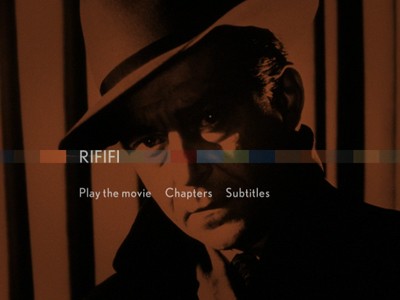
* Rififi (1955): Rififi is the story of Tony le Stephanois, played with hangdog fatalism by Jean Servais, probably best known to American audiences for his small role in The Longest Day. Tony is freshly out of jail, where he spent five years taking the rap for a jewel heist all by his lonesome, never selling out his crew. For his troubles, he has emerged with a bad cough, the outward symptom of his failing health. His girlfriend, Mado (Marie Sabouret), also hooked up with a new beau while Tony was inside--a cold-blooded hood (Marcel Lupovici) who runs the nightclub L'Age d'Or. Despite having regained his freedom, Tony seems to be moving farther and farther away from his own Golden Age. When we first meet him, he is losing a poker game. He is out of chips and all of his cards are played. It's almost a case of fortune telling.
Knowing he is at the end of the road, Tony wants one last score. When asked what he will do with his take of the jewels, he confesses to having no idea. Given that he may not have that long to actually ponder the situation, this would lead us to believe that the robbery is more about the action, of doing something to prove that he can. He originally refused to be a part of a smash-and-grab job, but after it's clear Mado is no longer his, he throws in with the other guys only after upping the plan to a full-on heist. Certainly that has to count for something. The meeting with Mado is the most brutal scene in the film, with Tony taking a strap to her and marking her before sending her back to her new boyfriend. Dassin treads that line of showing a bad dude for what he really is, even as he is the de facto hero of Rififi. But then, that's what the title refers to, a slang term for the rough business that tough guys get into. In a memorable scene at the L'Age d'Or, the nightclub's singer (Magali Noël) performs a ballad that both explains and glorifies the lifestyle, laying bare the filthy business while also romanticizing its kinky thrills.
The scene between Tony and Mado is also an occasion to illustrate Tony's shift to the other side of life. As the violence explodes, the couple moves off screen while Dassin's camera goes in the opposite direction, zooming in on a photo of days gone by, of the lovers enjoying champagne long before this dirty business separated them. Like a standard noir anti-hero, Tony is cut off from his past even as it continues to dog him. The future is also beyond him, as represented by the godson, Tonio (Dominique Morin), who is named for the gangster. Little Tony represents the hope of the future, of having the option to be whoever he will be. Big Tony is already who he is, he can be nothing else. All he has then, is the present. Do what can be done now, cry about what is lost to you some other time.
That present makes the creamy filling of Rififi. The late-night robbery of the jewelry store is a stunning sequence. Shown in meticulous detail, and in absolute silence--no speaking, no music, only the ambient noise of the thievery--it is a truly genius exercise in story and style. If your concentration breaks during this portion of Rififi and you actually become aware that you are watching a DVD, check yourself. You're probably inhaling, as you almost literally are coming up for air, having been holding your breath to see if the guys succeed. Your heart will be in your throat when they crank their tools to break through the back of the safe, believe me. It's such an impressive sequence, Jean-Pierre Melville practically lifted the idea wholesale for his 1970 heist picture Le cercle rouge.
Knocking over the jewelry store is not the finale of the film, it's more like the fulcrum. From there, wheels are tipped and come rolling down to push Tony and his gang toward their final fate. This is noir at its finest, grisly and unforgiving. There is no escaping one's past, and there is no stopping the oncoming future.
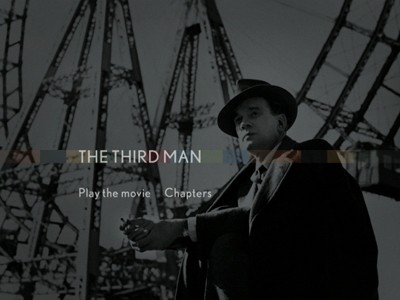
* The Third Man (1949): The Third Man is the story of Holly Martins (Joseph Cotten), a pulp novelist who has traveled to post-War Vienna on the request of his school chum, Harry Lime (Orson Welles). Believing he is coming to the bombed-out city to help with a medical charity, Holly is surprised to discover that Harry has died in what the police are calling an accident. Other versions of the story suggest it's murder. The loud and brash American wants Calloway (Trevor Howard), the more reserved British officer who had been investigating Harry, to look into the incident, but in Austria--a territory now divided by several different nations and thus criss-crossed by various standards of laws and lawlessness--such deaths will all come out in the wash. According to his police file, Harry Lime wasn't a very nice dude, and the city's populace is better off without him. Holly refuses to accept that Harry isn't the stand-up guy he always knew--even though even he admits that Harry was always running some kind of racket--and starts poking his nose where it doesn't belong. He's consistently warned away, but his cowboy naïveté shoves him hopelessly forward. It's Graham Greene's self-reflexive critique--the writer is going to have to learn the difference between the easy morals of the printed page vs. the complications of the real world.
The Third Man has earned a reputation based on three major components. First, the dark visual style. Reed plays up the noirish paranoia by taking full advantage of shadows, showing men in silhouette or their figures cast across a stone wall. The climactic chase through the Austrian sewers is dizzying and exciting, taking us down into the metaphorical underground of men's souls via the foreboding tunnels pumping their real world waste. The second component is the zither music, and the famous Harry Lime theme that would become an international hit.
The third, not coincidentally, is Harry Lime himself. As played by Orson Welles, he is an attractive scoundrel. When he shrugs and asks his pal what the big deal is, it's hard not to chime in, "Yeah, Holly, what's the big deal?" His entrance in the movie is often cited as one of the most famous in cinema. Where first there was darkness, then there is light, and with it, Welles' impeccable naughty-boy smirk. The amazing thing is that Welles is barely in the movie, only a couple of scenes. Oftentimes, when a movie is about how everyone is obsessed with one particular person, that person isn't interesting enough to make us understand why anyone is getting so bent out of shape. In this case, we see exactly why Harry Lime is the eye of this particular storm.
The director Reed and the writer Greene would collaborate together several times, but The Third Man is definitely their best effort. Perhaps it's telling that this is the one story they developed exclusively for the screen. It's a virtuoso thriller, full of twists, turns, and red herrings galore. Black humor that's really funny, slithering menace that really feels threatening, and a grisly denouement that ranks amongst noir's most cynical finales. If you've ever been concerned before, or even let down, by a film not living up to its reputation, The Third Man should cause no such concerns. This is the real deal, one that others will always be measured against. The Third Man is an absolute must.

* Touchez pas au grisbi (1954): Jean Gabin's Max the Mentor precedes Jean Servais' Tony le Stephanois from Rififi by only a year, but in a way, the two are as far apart as they could get. Then again, there is a lot about them that is the same, as they are both aging gangsters who are seeing that their time in the crime game is growing short. You could almost turn these two films into companion pieces, a single epic about two friends on opposite sides of the tracks. Call it something like Rich Crook, Poor Crook.
Whereas Rififi is set in rundown streets and hollowed-out buildings, Jacques Becker's Touchez pas au grisbi (translation: "Hands off the loot!") shows us the ritzy Parisian nightclubs where men of means pursue their more lurid hobbies. Whereas le Stephanois has had a less than successful career that has included jail time, Max has managed to stay on top for the duration. His nickname denotes the level of respect that others have for him: he's seen it all and knows how it's done. He spends his nights enjoying himself, indulging in the ladies and what have you; yet, he also manages to stay disciplined. He eats properly, stays clean, maintains a personal order.
Perhaps sensing something is in the wind, Max decides it's time to move on. He has made a big score in gold with his longtime partner Riton (Rene Dary), and once he unloads it, he can go off the job. For a guy who values being in control, things are starting to slip away that will make this complicated. Riton has a new girl (a young Jeanne Moreau) and information from his loose lips passes to hers, and then on to Angelo (Lino Ventura), the drug dealer angling for the top spot. Max even tries to offer up his own protégé, Marco (Michel Jourdan), to plug the hole he will leave, but it's no good. Riton gets kidnapped, and now Max's last big score will have a totally different payoff.
In contrast to the control Max is losing over his own life, Jacques Becker exerts it in spades over his film. Touchez pas au grisbi is masterfully constructed, moving at a confident pace and building in tension and suspense as Max's predicament worsens. It would be easy to just pile the conflicts on the beleaguered hood, but Becker is exacting in his plotting, twisting the plot only when it makes sense, not just for the sake of having more kinks in the narrative. The finale of the picture is haunting and desolate, involving a burning car far off the beaten path, a flaming symbol of the tragic end that could await all of these players if they don't maintain the core values of loyalty and commitment to purpose that Max has always placed his trust in and that have carried him through this far.
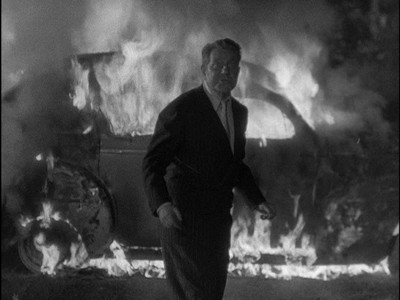
THE DVD
Video:
As noted at the outset, all but one of these films have previously been released as part of the Criterion Collection, and the same fine transfers that company is known for are used here. Some of the films are in full frame and some are widescreen, but all keep with their original aspect ratios; some are black-and-white and others are in color, but all of them have clean pictures with a minimum of scratches or dirt and only the most minor of digital problems.
The one disc I hadn't seen before was the HVE edition of Murderous Maids, and the widescreen transfer for the 2000 film is top-notch, with nice colors and no instances of pixilation.
Sound:
The nine older are all mixed in mono in their original languages, with optional English subtitles, including on the films with English soundtracks--though, in those cases, the subs are geared toward the deaf and hearing impaired. Murderous Maids is in stereo. As with the video quality, the audio mixes are all very good, without extraneous sound, distortion, or hiss.
Extras:
The movies that feature the theatrical trailers from the Rialto re-releases (as opposed to the original issue trailers) are as follows: Army of Shadows, Band of Outsiders, and Mafioso. For Murderous Maids, we are given the original theatrical trailer.
FINAL THOUGHTS:
Highly Recommended. This collection of films won't have much new for folks who are already fans of these kinds of film or are already Criterion Collection addicts, but for those looking for a quick starter kit for that foreign film library they've always meant to get going, 10 Years of Rialto Pictures is a great choice. With lots of European noir, a few heady classics, and even touches of comedy and personal drama, this retrospective has some of the best reissues of the last decade. The packaging is lean and mean, but the films will go on satisfying forever.
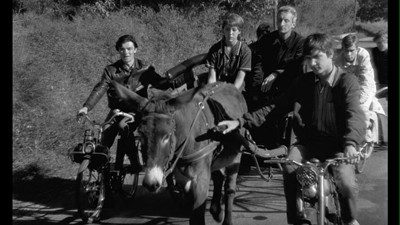
Jamie S. Rich is a novelist and comic book writer. He is best known for his collaborations with Joelle Jones, including the hardboiled crime comic book You Have Killed Me, the challenging romance 12 Reasons Why I Love Her, and the 2007 prose novel Have You Seen the Horizon Lately?, for which Jones did the cover. All three were published by Oni Press. His most recent projects include the futuristic romance A Boy and a Girl with Natalie Nourigat; Archer Coe and the Thousand Natural Shocks, a loopy crime tale drawn by Dan Christensen; and the horror miniseries Madame Frankenstein, a collaboration with Megan Levens. Follow Rich's blog at Confessions123.com.
|
| Popular Reviews |
| Sponsored Links |
|
|
| Sponsored Links |
|
|
| Release List | Reviews | Shop | Newsletter | Forum | DVD Giveaways | Blu-Ray | Advertise |
|
Copyright 2024 DVDTalk.com All Rights Reserved. Legal Info, Privacy Policy, Terms of Use,
Manage Preferences,
Your Privacy Choices | |||||||














